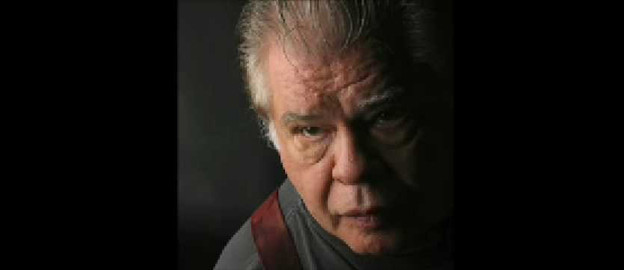I was just 22 when Clayton Eshleman first accepted my work for Caterpillar, encouraged no doubt by Robert Kelly. It was an important appearance for me, leading pretty directly to Jerry Rothenberg's suggestion that I gather some poets (no one had settled as yet on the term language) for Alcheringa and eventually to my editing In the American Tree. I also appeared four times in Sulfur.
I was quite aware of Clayton's reputation as a volatile young man, especially around issues of food & drink, and I had more than one opportunity to watch him send a dish or, more often, the wine back if it had not proved suitable. But he was a passionate defender of restaurants he liked and more than once he directed me to an excellent repast.
Once, when I was the director of development at the California Institute of Integral Studies in SF in the early 80's, Clayton called me mid-morning to say that he was in town and to ask if I wanted to go to lunch. I told him that the president of the school was taking his leadership team out for a business-meeting lunch (there was a reason but that part I've long since forgotten). Clayton wanted a recommendation for where to eat and you could have heard me wince over the land line. But I recommended a couple of places around the Haight that I liked, especially a yuppiesh California cuisine not-quite-fern-bar on Stanyan up the hill from where Bob Perelman and I had run the Tassajara Baker poetry series post-Grand Piano.
To my horror, when it came time for the Institute's team to head out for lunch, John Broomfield, the prez, announced that we were all going to go to that same restaurant. Sure enough, as we walked in there were Clayton & Caryl across the room mid-way through their meal. I went over to say hello, afraid to ask how the food was, then scooted back to the party from the 'Tute.
As Clayton & Caryl got up to leave, Clayton gave me the thumb & forefinger in a circle sign to let me know he'd enjoyed the food. I remember feeling like I'd pulled the sword from the stone.
d alexander, who helped me when I was starting Tottel's, used to tell a story that when he had published Clayton in his own journal, odda talla, a woman showed up at his place in New York with a gun wanting to discuss it. Clayton claimed that that never happened and that d loved a good story. [d, by the way, was his full first name and there was a story for that as well.]
On another occasion, Krishna and I had just dropped Colin off at a summer camp and gone to stay at a B&B in the Poconos that was mostly empty. There was a Brazilian building crew that was staying in the main lodge while they worked on some mansion nearby and we were told of a couple that was in one of the out buildings along a pond. We were instructed on what to do if we saw bears, but we went into town and had a nice dinner and went back to our room. The Brazilians were partying downstairs but they didn't speak much English and my Portuguese is aspirational at best.
The next morning we met the other couple, around our age, who were down from Staten Island. After we ate breakfast I excused myself to go off and write for an hour or so and when I returned to the main cafe Krishna was still chatting with them and had explained that I was off writing poetry. The woman looked at me and said, "Oh, do you know Clayton Eshelman?" She was Caryl's sister! We spent the rest of the morning listening to their Clayton stories (being "dragged" through the caves of France, an experience I would have given a leg for).
Jackson Mac Low, Armand Schwerner, Clayton, David Antin, Ronald Johnson -- so many of the poets who emerged in the 1960s right after the New American Poetry appeared -- are gone now. When Coyote's Journal (edited by Jim Koller with help in the early issues from Johnson & Ed van Aelstyn, every one of them gone as well), the magazine that seemed most central to my imagination of what poetry might be, went dark circa 1970, Caterpillar became THE journal, bringing everyone from Carolee Scheeman (having sex right on the cover with images from Fuses) to an issue devoted to Jack Spicer which (with Manroot in SF doing the same) kept his name alive in the long first decade after his death. Clayton was famously an impossible person, but his complete commitment to being exactly who he was gave him the courage to have a huge impact on American letters. If I remember right, Caterpillar is where Adrienne Rich chose to publish "Diving into the Wreck," the poem by which she freed herself from the polite restraints of the Lowell Group. Clayton published George Stanley DECADES before other US publications took notice. I was one of many who benefited from knowing Clayton & he was nothing but generous towards me. I won't forget him.



